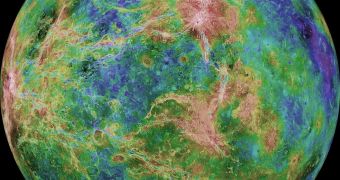Using data from the Venus Monitoring Camera (VMC) instrument aboard the European Space Agency's (ESA) Venus Express orbiter, scientists have recently determined that the geology present at the planet's equator is more geochemically advanced than researchers first suspected.
This is the first scientific study to be compiled based on VMC data. It was conducted by scientists with the Vernadsky Institute of Geochemistry and Analytical Chemistry in Moscow, Russia, who were led by expert Alexander Basilevsky.
The primary focus of their investigation was a portion of the highland terrain called Chimon-mana Tessera, and its surrounding volcanic plains. The team has learned that the highlands are significantly more diverse in terms of the chemical composition of the rocks making them up than the surrounding plains.
The latter are made up of standard, basaltic rocks, which result from volcanic eruptions. This is what researchers were expecting to see, so there were no surprises there. However, they did not expect to see such chemical diversity in rocks adjacent to the plains.
According to the research group, these data are in tune with information collected by the Venus Express Visible and Infrared Thermal Spectrometer (VIRTIS), while conducting studies over our neighboring world's southern hemisphere.
Studying the geology of Venus is not as simple as conducting similar investigations on Mars, for example, primarily because its surface is obscured by an extremely thick cloud cover, which obstructs view through optical instruments. Only radio scanners can pierce through the thick atmosphere.
“While VIRTIS and VMC have different strengths, they have complemented each other perfectly here by reaching a common conclusion while studying different regions of the planet’s surface,” ESA Venus Express project scientist, Håkan Svedhem, explains.
The study also suggests that the diversity of chemicals in the rugged Venusian terrain was not brought on by water, as some researchers argued. The emergence of these rocks can be explained by other mechanisms, which do not entail the existence of a liquid ocean on the planet's surface.
Venus Express has been studying our neighboring world since achieving orbital insertion around the planet, on May 7, 2006. The spacecraft launched on November 9, 2005, aboard a Russian-built Soyuz-FG delivery system.

 14 DAY TRIAL //
14 DAY TRIAL //